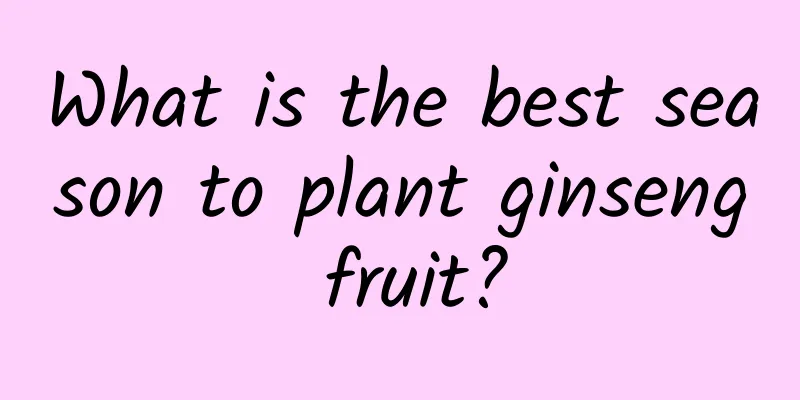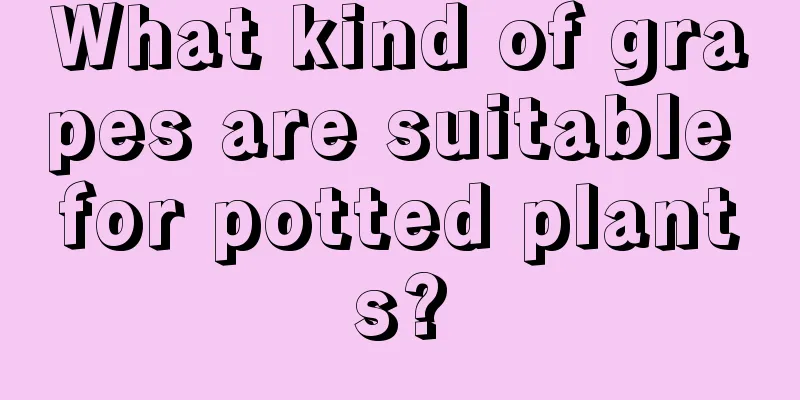What is the best season to plant ginseng fruit?

Ginseng fruit planting season and timeThe season for cultivating ginseng fruit can be spring or autumn. Generally, it is in early February. The ginseng fruit seedlings are cut after new buds grow at the base. After cutting, they are cultivated. They will bloom in about 40 days, which is around mid-March. They can be harvested about 50 days after flowering. Ginseng fruit can also be cultivated on the border of autumn and winter, generally in mid-August. The branches of the fruit trees are cut in mid-August. They will bloom around September 10 and can be harvested on January 1. All ginseng fruits will bear fruit after the Spring Festival. There are two common ginseng fruits in my country. One is a fruit produced in the Andes Mountains of South America, called eggplant, but in China it is called ginseng fruit. It blooms from April to June every year. There is also a plant called ginseng fruit in the Qinghai-Tibet Plateau of China, which is a perennial herbaceous wild plant. Local people call it longevity fruit, Penglai fruit, etc. The fruiting period is around the winter New Year. Ginseng fruit harvest seasonGinseng fruit is usually harvested in winter or autumn. If ginseng fruit can produce about 200 kilograms of one-year seedlings per acre, it will take two years, not longer. Three-year-old seedlings generally bloom next year, so it is best to plant two or more plants. Ginseng fruit planting steps and methods1. Land preparation, fertilization, and planting: Choose neutral soil and loose, fertile, easy to irrigate, ventilated, and light-permeable soil. Ginseng fruit likes fertilizer. Apply fertilizer after planting. Apply 4000-5000 kg of farmyard manure per mu, 50-70 kg of N, P, and K three-element compound fertilizer, 40-70 cm spacing between rows and plants, deep plowing 20-30 cm, level the land, and form a 70 cm wide strip ridge with a height of 10 cm. Select the branches that are more than 10 cm high, and plant them into a shape of 50cm×50cm. It is generally recommended to plant tonight, 2000-3000 plants per mu. After planting, pour in rooting water. 2. Fertilizer and water management: In addition to fertilization, 3 kg of N, P, and K fertilizers are also required per mu, and watering is required except for 10 cm from the main root of the seedling. Boron fertilizer or trace elements such as Su Baofeng No. 2 should be appropriately applied during the flowering and fruiting period. A small amount of nitrogen, phosphorus, and potassium compound fertilizers should be applied frequently, and attention should be paid to inter-cultivation and weeding. Generally, fertilizers are applied once every 10 days, and potassium fertilizers are applied more after flowering. The period when ginseng fruit growth and flowering most require water is from March to June and from September to November, so watering should be done in time. 3. Pruning: Ginseng fruit has strong germination ability, so the branches should be pruned immediately. From the part above 15-20 cm of the plant, select 3-5 strong and evenly distributed branches as the main branches, and remove all the others. Leave 2-3 inflorescences on each side branch, and 2-3 fruits on each inflorescence. Remove all the other inflorescences and small fruits. Each plant can only produce 30 fruits at most. Because the stems of ginseng fruit are very soft, bamboo sticks and plastic ropes must be used to support them when they start to bear fruit to prevent them from falling. |
<<: What are the cultivation methods and precautions of hibiscus?
>>: When is the best season to plant Astragalus membranaceus
Recommend
How to grow lotus seedlings? Are they afraid of direct sunlight?
1. Reasonable exposure to light Lotus is a long-d...
How to make camellia bloom faster
1. Flowering period and bud thinning If you want ...
How about drinking lemon water?
How to make lemon water It is actually very simpl...
Does Schefflera prefer shade or sunlight?
1. Prefer semi-shade Strictly speaking, Scheffler...
How to take care of newly bought Gloxinia
1. How to care for newly bought Gloxinia The root...
What are slugs and how to eliminate them
1. What is Slug is a pest, a general term for ani...
How to grow Thousand Birds Flower
1. Maintenance methods 1. Temperature: The cold r...
How to eat kumquat
Eat kumquats raw Kumquat contains a lot of vitami...
Characteristics of Mimosa pudica (plant Mimosa pudica), pictures of Mimosa pudica
1. Characteristics of Mimosa Mimosa is also calle...
When do Phalaenopsis orchids bloom?
1. When is the opening time? Phalaenopsis usually...
How to make dried figs
Material selection and slitting Choose a large, f...
How to switch from soil-grown Clivia to hydroponics
1. Steps The first thing we need to do is wash th...
How to breed earthworms?
Earthworms, also known as earth dragons , feed on...
How long does it take for Wisteria cuttings to take root? The fastest way to root cuttings
Wisteria cutting rooting time Wisteria can be pro...
Bulb fennel planting time and method cultivation and management technology
When to plant fennel bulbs Bulb fennel is grown i...









